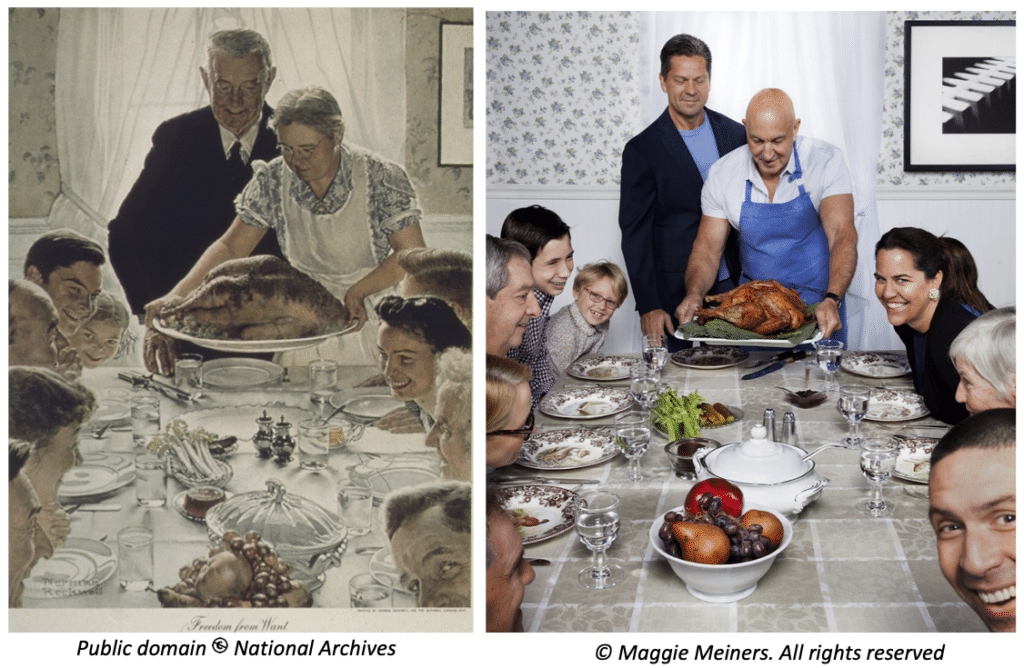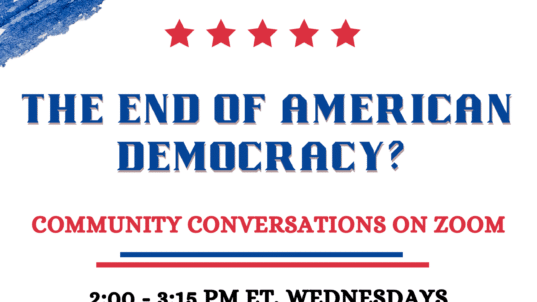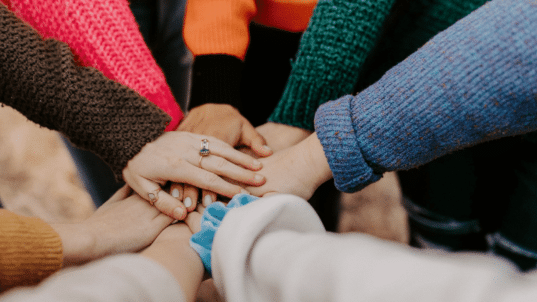
What does the freedom from want mean? And how does it relate to the spirit of democracy?
In this four-part exploratory conversation series, Four Freedoms: The Spirit of Democracy Today and Tomorrow, we are helping each other explore different aspects of freedom. To do this, we’re looking at the four freedoms articulated by FDR as core human rights and as they are depicted by artists Norman Rockwell and Maggie Meiners: freedom of speech, freedom of worship, freedom from want, and freedom from fear. In our conversations on May 25th, we explored freedom from want. Below we have summarized some of the different ways the participants were thinking about freedom from want and how it relates to the spirit of democracy.
What would you add about the meaning of freedom and the spirit of our democracy? Please join us by registering for our final session in this series this coming Wednesday, June 8 at 1 pm ET to explore freedom from fear (more series info at the link). What do you think freedom from fear could mean or should mean? What if our democracy embraced freedom from fear as a core value? And how might this freedom relate to other values in a healthy democratic society? Join our next community conversation to explore these questions and enrich our sense of what freedom can mean.
How might Rockwell’s and Meiners’ depictions of Freedom From Want help us understand different aspects of this freedom?
- The images show positive versions of this freedom, at least for food. Instead of “want,” they show its opposite–a celebration of the bounty, the plenty, …the excess?
- Both images depict a communal family gathering, a celebration, togetherness. In part they remind us that it’s not just about having enough calories to survive. It’s also social, a celebration; it’s about acceptance, belonging, and family–of all types. These are also basic needs.
- Comparing the two images shows some of the changing demographics and times–at least in part. The updated version includes a gay couple, more color overall, including the food, and a smaller turkey (?).
- The value of coming together in some way to celebrate and express our gratitude.
In the bigger picture, what are some key issues, concerns, or limits for freedom from want?
- Freedom from Want may bring to mind our own personal experiences with want, with poverty–of times when we’ve not had enough to eat, or a home, or a job, or access to healthcare, etc.
- What do we mean by “want”? Is it just economic poverty, the lack of certain “basic needs”? Or does it also include our many other desires, including those beyond basic needs?
- This freedom highlights the tragic irony of the vast disparities between the many who are wealthy (or at least comfortable) and that all too significant portion of our society that cannot afford or don’t otherwise have access to even basic housing, food, jobs, education, or healthcare.
- Lack of access to healthcare–or affordable healthcare–seems to be a “want” that increasingly affects us all. Our current healthcare system does not feel like “freedom”–from anything.
- Our understanding of “want” and “need/necessity” have changed over time. Yesterday’s luxuries often become tomorrow’s necessities–at least when our economy and living standards are generally growing.
- Do younger generations have higher expectations or standards for basic needs; and/or do they face different, possibly more challenging circumstances in meeting those needs? For example, more education is required for work, while the costs for education, housing, healthcare, etc. are all significantly higher than in the past.
- Considering just basic needs, what are they, and has this list changed over time? Does it include access to–
- safe food and water, adequate shelter/housing,
- jobs, education, healthcare
- affordable child care (and senior care) to support workers and families
- some form of transportation
- an adequate minimum wage, a livable wage, and equal pay for equal work
- some amount of leisure or time off from work
- communication networks: phone and internet service
- arts & culture, to nature/recreation?
- Also a sense of security, peace, safety, contentment; and the absence of constant or overwhelming fear or anxiety.
- Our social and emotional needs and mental health matter too. We all need social supports of family, neighbors, and other communities.
- Social interactions, including discussions like these, should also be considered part of the necessary social infrastructure. We need more and better opportunities to talk with and listen to each other.
- We also need some shared values like empathy, ethics, morality, equality.
- Should we provide only equal “access”? Should there be a minimum floor (and ceiling?) for standards of living as well?
- There are also significant challenges or limits to our ability to provide these basic needs or desires:
- The cost: how do we pay for it? We may not have enough shared resources to provide for all, and taxation impinges on taxpayers’ individual property rights.
- Our limited expectations of the role and abilities of government: that it’s not set up to provide for many of these needs; that we don’t necessarily want a large “nanny state” that might deter individual motivation or a sense of “personal responsibility.”
- The value we place on the notion of rugged individualism, of “pulling one’s self up by their own bootstraps.”
- Concerns with the real (and perceived) failures, fraud, and abuse that have beleaguered certain governmental initiatives.
- Our current political structures, including minority rule, make any change difficult if not impossible–even changes that have overwhelming public support.
Looking forward, how might we better fulfill this freedom? Or what might it look like in the future?
- Focus on working hard, discovering and using your talents.
- Yet many don’t have–and won’t have–either the boots or the bootstraps to pull themselves up without some help.
- Concerns for the growing polarity, hubris, animosity and viciousness of our politics and political discourse, and what this may mean for the future of our democracy. Will we be able to continue to gather together to celebrate Thanksgiving–or to govern ourselves?
- Less consumerism: focus on your internal happiness and less on getting or having more things.
- Help others; practice charity: We’re a generous country, and we can all help in some way by donating our money, time, and talents to help others.
- We need to be open to change and to asking each generation anew what they need to be free from want.
- Perhaps we should adopt some ideas from the Scandinavian countries for providing certain necessities such as healthcare, a livable minimum wage, paid family and personal leave, more robust unemployment benefits, low-cost or no cost education, affordable child care and senior care, or even a universal basic income (“UBI”).
- Fulfilling the promise of Freedom from Want–both today and into the future–is a very real and ongoing challenge to our democracy.



